With deep sadness we announce the death April 3 of Ezra Eta Gurvičiūtė. She was born in 1920 and was preparing to celebrate her 104th birthday this month. She was a member of the Lithuanian Jewish Community from the beginning and served for decades as a volunteer at the Community’s medical consultation center. Chairwoman Faina Kukliansky and the entire Community extend our sincere condolences to her son Eduardas Elija, grandchildren Tomas and Julija and her great-grandchildren. Final farewells can be made today, April 4, at 6:00 P.M. at the Nutrūkusi styga funeral home in Vilnius. The burial will take place at the Jewish cemetery on Sudervės road in Vilnius at 12 noon April 5.
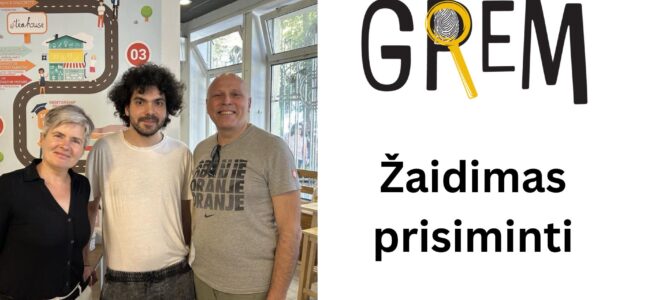
A Game to Remember
“A Game to Remember”: Immerse Yourself in Stories That Change the World
The Lithuanian Jewish (Litvak) Community and its partners are launching “A Game to Remember,” an innovative project where history comes to life through interactive detective games. We invite you to travel back in time and experience the stories of Holocaust survivors ina new, engaging way.The European historical experience serves as a fundamental pillar of the European Union’s values. Today, as we face historical distortions, threats of war, and rising hatred, the preservation of memory and education about the events of the past century are more important than ever. We must remember the destructive power of authoritarian regimes, the significance of resistance, the tragedy of the Holocaust, and other historical turning points.
Only by understanding the past can we strengthen democracy and build a more peaceful future. The Lithuanian Jewish (Litvak) Community, together with a team of educators from Lithuania, has developed an interactive tool based on the principles of a detective game. This tool helps students expand their knowledge and gain a deeper understanding of Holocaust history in Lithuania. The educational research is based on Icchokas Rudaševskis’s “Vilnius Ghetto Diary.”
During the session, participants will solve a series of interconnected detective tasks and puzzles, ultimately leading one of the investigation teams to uncover the mystery of the study.
Who Are We?
We are an international team from five European countries: Bulgaria, Germany, Hungary, Lithuania, and Spain. Our mission is to collect and preserve Holocaust testimonies, transforming them into powerful educational tools.
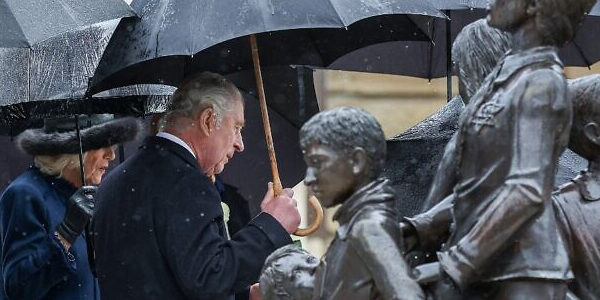
Charles Commemorates Child Refugees in Hamburg
BERLIN (AP)–King Charles III commemorated the more than 30,000 people, mostly German civilians, who were killed in the Allied bombing of Hamburg almost 80 years ago as he visited the northern city Friday on the last leg of his first foreign trip since becoming monarch.
The attack in July 1943 carried out by British and American planes using incendiary bombs was a response to Nazi Germany’s deadly aerial raids on Britain. It resulted in a firestorm which destroyed large parts of the city and remains a painful memory in the Hanseatic port’s proud history.
Charles laid a wreath at the ruined church of St. Nikolai, now a memorial site, and listened to Hamburg’s bishop Kirsten Fehrs read the Coventry Litany of Reconciliation written to commemorate the destruction of the English city of Coventry by German bombers in 1940.
Earlier, Charles and Camilla visited a memorial to the Kindertransporte, or children’s transports, when more than 10,000 Jewish children found refuge from Nazi Germany in the U.K. in 1938.
Full story here.
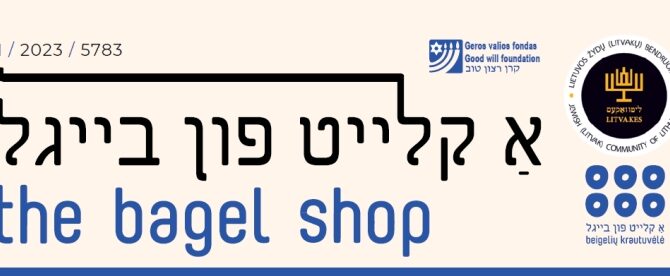
New Bagel Shop Newsletter
A new Bagel Shop Newsletter has been published for the first part of 2023. A PDF file of the newsletter is provided below.
Bagel_Shop_Newsletter_2023If your browser doesn’t display the file, you can download it by clicking here.
.

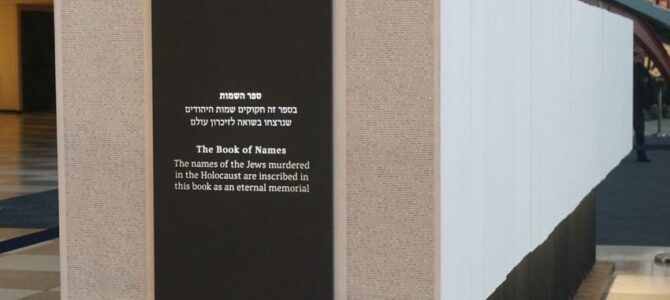
New Book of Names at Yad Vashem
Since its establishment Yad Vashem has endeavored to gather the names of the six million Jews murdered in the Holocaust, one of its central missions. Yad Vashem’s Book of Names is the unique result of meticulous and painstaking work that commemorates 4,800,000 men, women and children whose details have been gathered and uncovered over the years, through Pages of Testimony, the location of various Holocaust-era documents, cooperation with memorial sites and more, which are memorialized in Yad Vashem’s Central Database of Shoah Victims’ Names.
The Book of Names actualizes the inconceivable number of Holocaust victims, and displays their names together with their dates of birth, hometowns and places of death, when known. The information is printed on pages measuring two meters high and one meter wide, with the details illuminated by a gentle beam of light that shines from between the pages. The massive dimensions of the Book of Names testify to the enormity of the collective and unimaginable loss for humanity as a whole and for the Jewish people in particular. The last pages of the book are empty, symbolizing the names that are yet to be retrieved, documented and commemorated, and which perhaps never will be.
Designer: Chanan De Lange
The Book of Names was produced with the generous support of Marilyn and Barry Rubinstein, USA.
Opening: March 29, 2023.
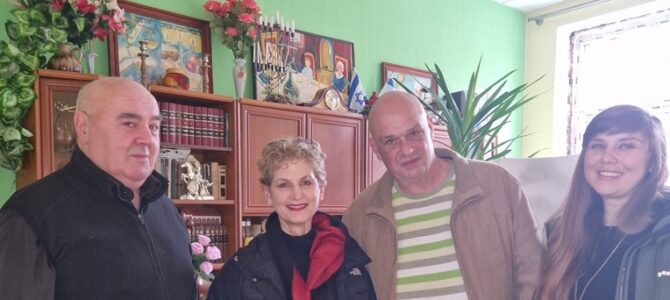
Nancy Sasson Travels to Panevėžys Seeking Family Roots
Last week Nancy Sasson from the United States arrived in Panevėžys seeking genealogical information about her family. She believes her grandfather and perhaps great-grandfather lived in Panevėžys. She was accompanied by her old friend from Lithuania Vaida Zlatkutė and a guide who travelled from Israel to help.
Panevėžys Jewish Community chairman Gennady Kofman received them warmly and he and the Israeli guide gave the two women a tour of the city, pointing out significant Jewish locations and telling the Litvak story, the many important cultural contributions Litvaks made and the horrific end they suffered.
Nancy Sasson was visibly moved during the tour down the streets and sidewalks once traversed by her forebears.
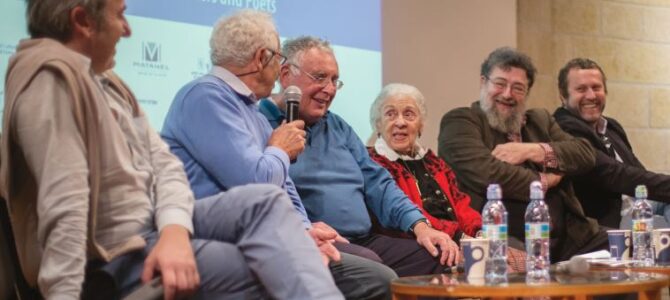
Lithuanian-Born Yiddish Poet Rivka Basman Ben-Haim Dead at 98
Yiddish poet Rivka Basman Ben-Haim died last week at the age of 98, the Jerusalem Post reports. She was the last living Yiddish poet of her generation.
She refused to call herself a Holocaust survivor. The person who entered the Nazi camps, she explained, did not survive, but died, and a different person emerged. Rivka found comfort in their new families, friendships and in love.
She was born in Wilkomir [Ukmergė], Lithuania. Her father and brother were murdered. She spent around two years in the Vilna ghetto and was then sent to the Kaiserwald concentration camp in Riga.
Full Jerusalem Post story here.
More information about Basman’s Litvak origins and life here.
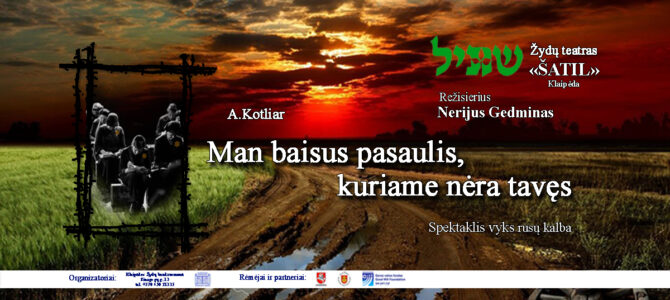
New Holocaust Play from Klaipėda Coming to Vilnius
The Klaipėda Jewish Community theater Šatil is preparing to stage the play “Man baisus pasaulis, kuriame nėra tavęs” [A World Without You Horrifies Me] based on the work of Maja Tarachovskaja (Майя Тараховская, Maya Tarakhovskaya) in Vilnius.
The play tells the story of a Jewish girl named Mirka who escaped from a train on the way to a death camp. She is forced by circumstances to make the hard decision to leave her son with the villager woman who rescued them in order to save her newborn baby.
“And I left, in the night, for nowhere, leaving to that woman two priceless gifts: I gave her you, and the only existing photograph of your father,” a heartbroken Mirka says in the play.
The play, directed by Nerijus Gedminas, is in Russian and will debut Tuesday, April 11, at the Russian Drama Theater at Jono Basanavičiaus street no. 13 in Vilnius.
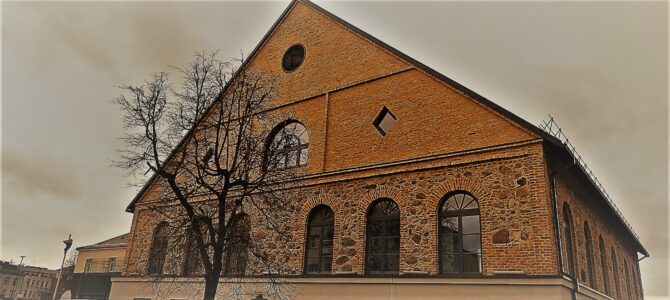
Synagogue Restored in Kupiškis
One of the synagogues in Kupiškis, Lithuania, which houses the town’s public library has been undergoing restoration for the last six years. On Friday, March 24, Lithuanian Jewish Community chairwoman Faina Kukliansky, Israel ambassador to Lithuania Hadas Wittenberg Silverstein and US ambassador Robert Gilchrist visited the synagogue and saw the results of the reconstruction work.
“A large Jewish community lived in Kupiškis before the war,” chairwoman Kukliansky said. “They were almost all exterminated by the Nazis and local collaborators. It is right that their story is remembered, if only eighty years later, and that the residents of Kupiškis who come here or pass by outside will see this building and be reminded of the great contribution Jews made to the community’s success.”
Jews settled in Kupiškis sometime in the 17th century. In 1682 bishop Mikołaj Pac (Mikolajus Pacas in Lithuanian) issued a permit for the construction of a synagogue. Around 2,661 Jews accounting for 71% of the population lived in Kupiškis in 1897. During the period between the two world wars there were three working synagogues in the town, adjacent and forming a courtyard, with the Great Synagogue on the northern side, the Small Synagogue on the south and the Hassidic synagogue on the western side. The Great and Hassidic synagogues survive. In 1950 the Great synagogue building was used as the town’s public library. The entrance way into the library has a commemorative plaque with a citation from the Book of Isaiah, 56:5: “I will give them an everlasting name, that shall not be cut off,” in Hebrew, English and Lithuanian. The first floor of the building is now being used as a library with the second storey as space dedicated to the Jewish community.

New Publication of Shur’s Entries: A Chronicle of the Vilna Ghetto, 1941-1944
Grigoriy Shur’s Vilnius ghetto diary has been reissued with support from the Goodwill Foundation, with a new cover and new introduction.
Perhaps the most informative of the several Vilnius ghetto diaries, Shur’s manuscript was originally published in Lithuanian translation by the Era publishing house in Vilnius in 1997 with partial funding from the Lithuanian Culture Ministry, and was roundly ignored by the general public.
The new edition is the same translation published by Era back in 1997 by Nijolė Kvaraciejūtė and Algimantas Antanavičius. It contains the same introduction by Pranas Morkus and forward by Vladimir Porudominsky, but adds a new and short introduction by the writer Vytautas Toleikis, who surveys recent Holocaust literature published in Lithuanian, including his keen observations about the book “Mūsiškai” [Our People] by Rūta Vanagaitė and Efraim Zuroff, or more precisely, how Lithuanian nationalists responded to it. Here’s a rough translation of part of Toleikis’s introduction:
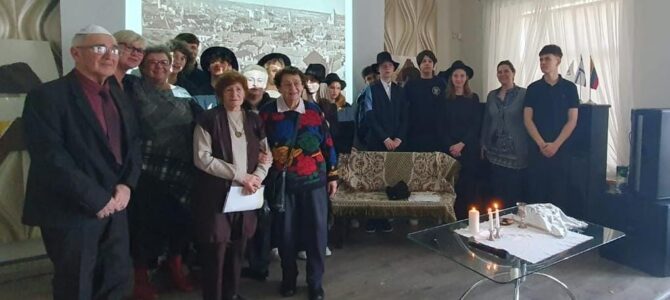
Senior Citizens Visit High School Freshmen
As part of the “From Generation to Generation” project by the Anu Museum of the Diaspora in Israel, seniors from the Lithuanian Jewish Community’s social center met with 9th-grade students from the Sholem Aleichem ORT Gymnasium in Vilnius to share thoughts and bridge the generations.
A few weeks ago the high school students visited the Seniors’ Club at the LJC. This time the seniors went back to school where they were given a tour of the facilities including the modern classrooms, labs and an art exhibit currently on display there. Our seniors also attended a Sabbath ceremony with students from all grades. The students presented drawings they made to the seniors as gifts. Seniors and students later met in the library and shared stories, which were recorded and will be sent to the Anu Museum in Tel Aviv.
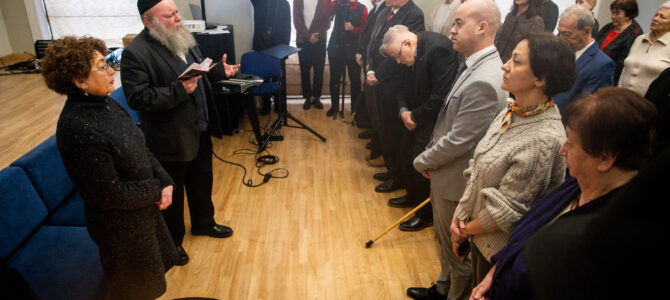
First Day of Rescuers Celebrated at Lithuanian Jewish Community
In 2022 the Day of Rescuers of Lithuanian Jews was added to the list of official commemorative dates in Lithuania. The date March 15 was chosen as the day in 1966 when the Yad Vashem Holocaust authority in Israel first recognized a Lithuanian as a Righteous Gentile. As a new commemorative date, there is no set tradition on how to celebrate the holiday. The Lithuanian Government urged public commemoration of March 15 and included two events as possible venues: the opening of an exhibit about Righteous Gentiles at a museum in Vilnius, and a reading of the names of rescuers at Vilnius University, a tradition associated with the many victims of the Holocaust, many of whom remain unknown except for their names, rather that with the heroes of the Holocaust, most of whose biographies at least in Lithuania have been fully explored and documented.
The Lithuanian Jewish Community celebrated the first instance of Rescuers Day by recalling how the Jews of Lithuania actually live. As LJC chairwoman Faina Kukliansky has said repeatedly, if not for the Righteous Gentiles in Lithuania, no Litvaks would have survived in Lithuania.
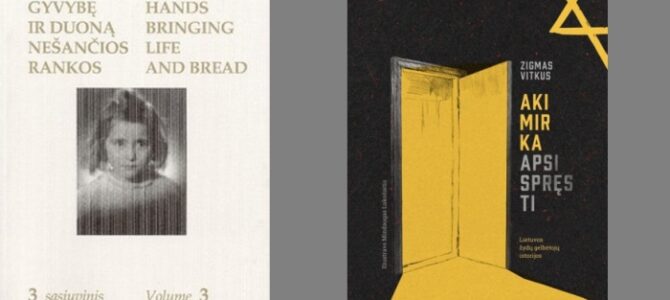
Stories of Lithuanian Rescuers of Jews
In 2005 the Department of Righteous Gentiles of the Vilna Gaon Museum published their third edition of “Hands Bringing Life and Bread” in a combined Lithuanian- and English-language edition. According to the museum’s website it:
“contains stories of those who showed humanity during the darkest hours of history, the Righteous Gentiles. It is dedicated to Ona Simaitė in celebration of the 110th anniversary of her birth. This courageous woman is well known for her deeds during WWII, but is only one of 72 Rescuers of Jews in Lithuania presented in this volume.”
Compiled by Viktorija Sakaitė and edited by Dalija Epšteinaitė, 2005, 128 pp.; Lithuanian & English, ISBN 9986-34-144-2
Featured here.
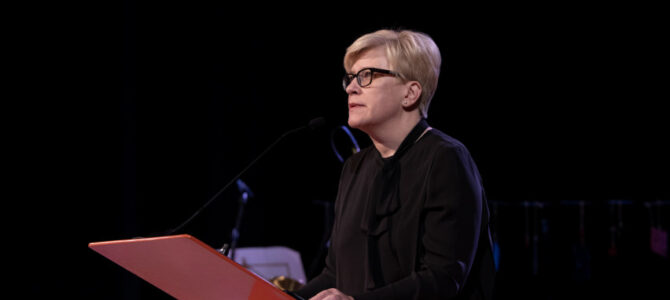
Lithuanian PM Calls for Celebration of First Jewish Rescuer Day in Lithuania
On March 15 Lithuania will celebrate the Day of Rescuers of Lithuanian Jews for the first time, included on the official list of commemorative days late last year. The day will include a number of events including a reading of the names of rescuers at Vilnius University at 4:00 P.M. and the opening of an exhibition on Righteous Gentiles at the Marija and Jurgis Šlapelis Museum located at Pilies street no. 40 in Vilnius.
“Great challenges don’t just destroy, they also awaken heroes. Those whose deeds kindle endless hope. Those thanks to whom today we aren’t just talking about victims and murderers, but also about the rescuers. Those who pass on to all coming generations the clear knowledge that we can always chose the light, even in the darkest night,” Lithuanian prime minister Ingrida Šimonytė said.
Full article in Lithuanian here.
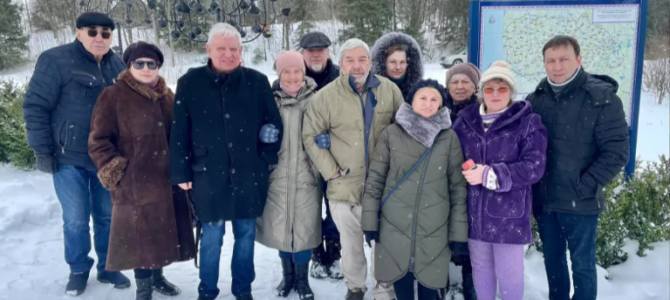
Commemorating Righteous Gentile Ona Šimaitė
On March 12 in the middle of a blizzard people gathered at the Litvak Commemorative Garden in Plateliai, Lithuania, to commemorate Lithuania’s first-recognized Righteous Gentile, Vilnius University librarian Ona Šimaitė.
Lithuania marks the first-ever Day of Rescuers of Lithuanian Jews in the country March 15. It was on this day in 1966 that Yad Vashem in Israel recognized Ona Šimaitė as the first Righteous Gentile from Lithuania.
The Litvak Commemorative Garden has a number of metal apple tree sculptures with the names of Lithuanian Jewish communities exterminated in the Holocaust and Lithuanian Righteous Gentiles inscribed on the apples.
Full story in Lithuanian here.
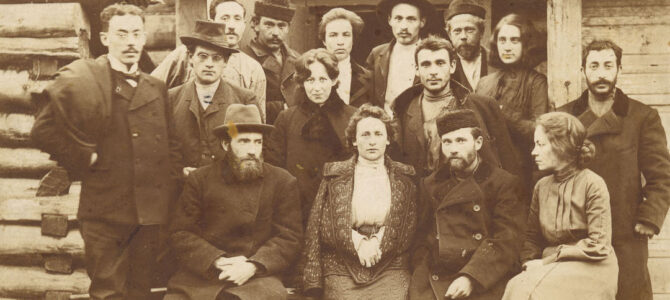
YIVO to Digitize Treasure Trove of Leftist History
New York Jewish Week–YIVO has launched an eight-year project to digitize its Jewish Labor and Political Archives, widening access to some 3.5 million pages related to Jewish revolutionary, socialist and labor movements in Europe and America.
The project, the largest archival digitization project in the history of the Jewish research institute, will shine a light on the Jewish Labor Bund whose archives survived the Nazis and form the core of the collection.
Founded in Vilna in 1897 by Jews influenced by Marxism, the Bund played a central role in organizing Jewish trade unions and aligned with various socialist parties in pre-WWII Europe. It administered a massive network of secular Yiddish schools, stood up against anti-Semitism and supported an underground network against the Nazi genocide, activities kept up by members who managed to flee to New York in the early 1940s.
That history is reflected in the journey of the archive materials which were seized by the Nazis but were later rediscovered in France after the German army’s retreat. In 1951 the Bund Archives was brought to New York, and transferred to YIVO in 1992.
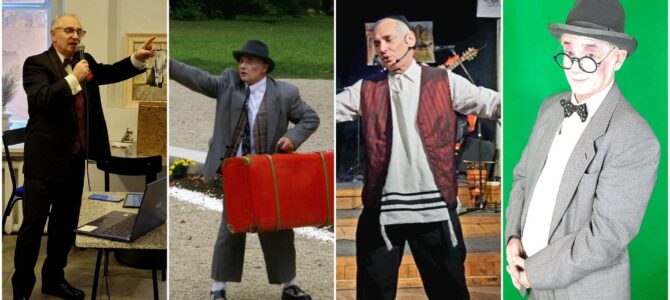
Sunday Quiz on Jewish Theater
The quizzes go on, this coming Sunday around the topic of Jewish theater. Come and show off your knowledge, or learn something new. Presented by writer, philosopher, mime and circus performer Arkadijus Vinokuras, the quiz will take place at the Bagel Shop Café at Pylimo street no. 4 at 2:00 P.M. on Sunday, March 19. Register by sending an e-mail to Katrina at katrina@lzb.lt.
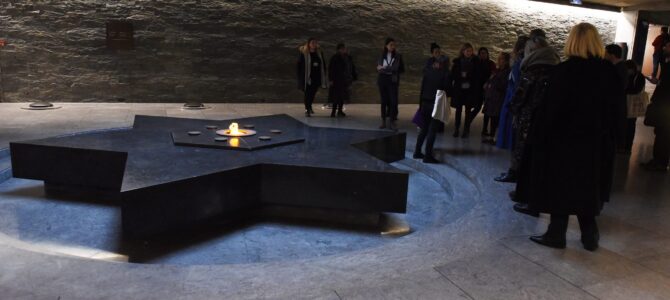
European Days of Jewish Culture 2023
Organizers and coordinators of the European Days of Jewish Culture for 2023 events met in Paris in late February and decided upon the theme “Citizens, equality, rights and values” for this year’s celebrations.
Most meetings and seminars took place at the Shoah memorial in Paris with meetings on the second day at UNESCO headquarters in Paris.
The European Days of Jewish Culture are scheduled to begin on the first Sunday in September, 2023.
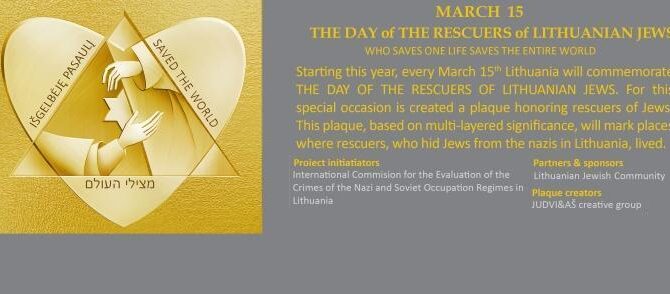
March 15 Is Day of Rescuers of Lithuanian Jews
This year Lithuania marks March 15 as the day of rescuers of Lithuanian Jews for the very first time. To celebrate this important date, the Lithuanian Jewish Community presents a special plaque to commemorate the rescuers. The plaque, with multiple layers of symbolism and meaning, will be placed on residences where the rescuers lived and hid Lithuanian Jews from the Nazis.
“This is our thanks to the brave people who didn’t falter in the face of danger and who were not just the rescuers of Jews, but, as Icchokas Meras wrote, were also the blossom of goodness of their nation and heroes of the spirit who resisted the murderers,” LJC chairwoman Faina Kukliansky commented. Her family was also saved from the Holocaust by brave Lithuanians with big hearts, rescuers who number among the 900 Yad Vashem recognizes as Righteous Gentiles in Lithuania.
Plaque designed by the JUDVI & AŠ creative group.
Project author: International Commission for Assessing the Crimes of the Nazi and Soviet Occupational Regimes in Lithuania.

